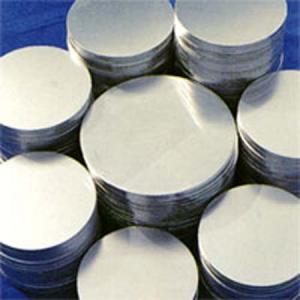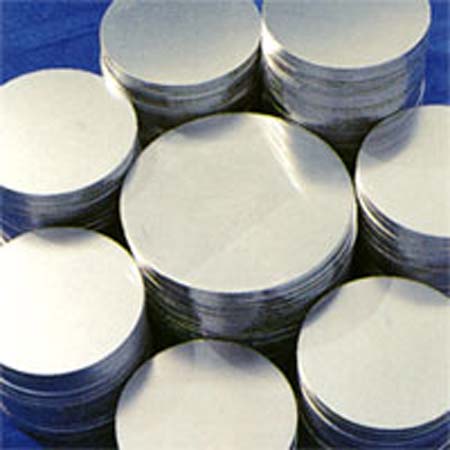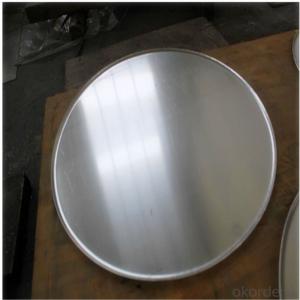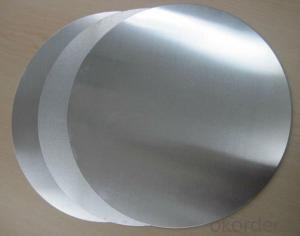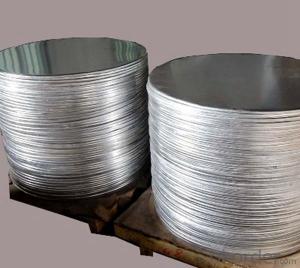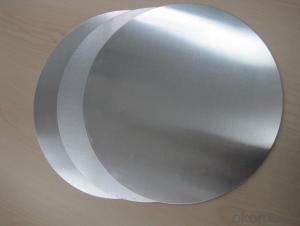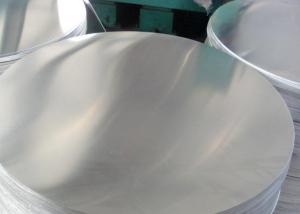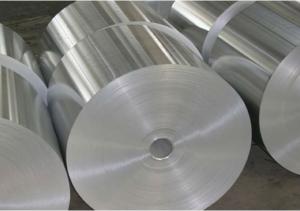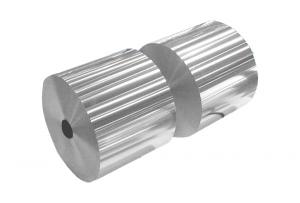Aluminum Goods Aluminum Circle for Household Utensils
- Loading Port:
- China Main Port
- Payment Terms:
- TT OR LC
- Min Order Qty:
- -
- Supply Capability:
- -
OKorder Service Pledge
Quality Product, Order Online Tracking, Timely Delivery
OKorder Financial Service
Credit Rating, Credit Services, Credit Purchasing
You Might Also Like
Alloy: AA1100
Temper: H14/16/22, HO etc.
Thickness:0.5mm—4mm
Diameter:100mm—1200mm
Application: Kitchen wares, including fried pans, non sticky pans, cooking pots, hardanodize cook ware, pressure cooker and house hold utensils, etc.
Standard: GB/T 3880-2006
CC- Continue Casting for Spining
DC- Direct Casting for Deep Drawing
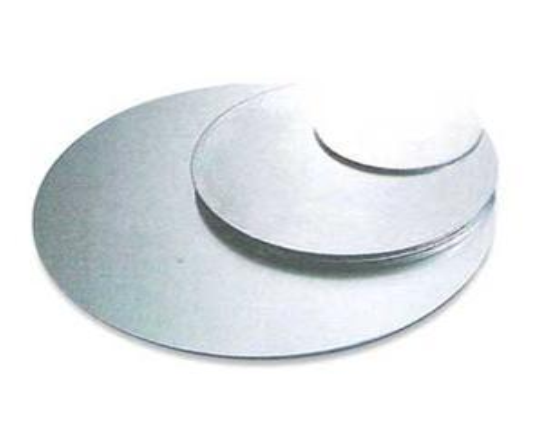
- Q: Is it possible to utilize recycled aluminum for the production of cars or other types of vehicles?
- <p>Yes, recycled aluminum can be used to make cars and other vehicles. It is common practice in the automotive industry to use recycled aluminum in the manufacturing process due to its lightweight and strong properties. Recycled aluminum requires less energy to produce than new aluminum, making it more sustainable. It is used in various parts of vehicles, including engine components, body panels, and wheels. The use of recycled aluminum not only reduces waste but also contributes to energy savings and carbon emission reductions in vehicle production.</p>
- Q: Is it safe and common to use aluminum for the production of containers for food and beverages?
- <p>Yes, aluminum is commonly used to make containers for food and beverages. It is lightweight, durable, and provides excellent resistance to corrosion. Aluminum cans are widely used for beverages like soda and beer, and aluminum foil is often used for food packaging. However, it's important to note that the interior of aluminum cans is usually lined with a protective coating to prevent direct contact with the food or drink, which can help to mitigate any potential health concerns related to aluminum exposure.</p>
- Q: This question asks about the methods used to determine the hardness of aluminum material.
- <p>The hardness of aluminum can be measured using various standardized tests. The most common methods include the Brinell Hardness Test, where a hard steel or carbide ball is pressed into the aluminum surface, and the Vickers Hardness Test, which uses a diamond pyramid indenter. The Rockwell Hardness Test is also used, applying a diamond cone or steel ball to the surface. The hardness is quantified by the depth of the indentation, and the results are expressed in specific hardness units like BHN (Brinell Hardness Number), HV (Vickers Hardness), or HR (Rockwell Hardness). These tests provide a measure of the material's resistance to deformation, which is crucial for applications requiring strength and durability.</p>
- Q: Is aluminum a suitable material for use in the electronics manufacturing industry?
- <p>Yes, aluminum is widely used in electronics manufacturing due to its excellent electrical conductivity, lightweight nature, and resistance to corrosion. It is commonly used in various electronic components such as heat sinks, capacitors, and wiring. Aluminum's malleability also allows it to be easily shaped into different forms, making it versatile for manufacturing purposes. Additionally, it is cost-effective and abundant, which further contributes to its popularity in the electronics industry.</p>
- Q: This question asks about the energy consumption involved in the recycling process of aluminum.
- <p>Recycling aluminum requires significantly less energy compared to producing aluminum from raw materials. It takes about 5% of the energy needed to produce new aluminum from bauxite ore. This energy efficiency is due to the fact that recycling aluminum involves melting down the metal, which requires less energy than the extraction and refining processes involved in primary production. The exact amount of energy saved can vary depending on factors such as the purity of the recycled material and the efficiency of the recycling process, but overall, recycling aluminum is a much more energy-efficient method than mining and refining new aluminum.</p>
- Q: This question asks for an overview of the environmental effects resulting from the production of aluminum.
- <p>Aluminum production has several significant environmental impacts. The process is energy-intensive, contributing to high greenhouse gas emissions, primarily CO2, which exacerbates climate change. It also generates hazardous waste, such as red mud, a byproduct rich in alkaline and heavy metals that can contaminate soil and water if not properly managed. Air pollution is another concern, with emissions of particulates and sulfur dioxide affecting air quality. Additionally, the mining of bauxite, the primary source of aluminum, can lead to deforestation and habitat destruction, impacting biodiversity. Water usage in the production process is substantial, which can strain local water resources. Lastly, the release of fluoride compounds can have detrimental effects on human health and the environment.</p>
- Q: Can recycled aluminum be utilized in the production of solar panels and other renewable energy technologies?
- <p>Yes, recycled aluminum can be used to make solar panels and other renewable energy sources. Aluminum is a key component in solar panel frames and mounting structures due to its lightweight, high strength, and corrosion resistance. Recycling aluminum saves energy and resources compared to mining and refining new aluminum. Additionally, recycled aluminum can be used in wind turbines, hydroelectric generators, and other renewable energy technologies where its properties are beneficial. The use of recycled materials in renewable energy production contributes to a more sustainable and circular economy.</p>
- Q: Explain the distinctions between aluminum alloys and pure aluminum in a few sentences.
- <p>Aluminum alloys and pure aluminum differ in composition and properties. Pure aluminum is soft and has low strength, making it less suitable for structural applications. In contrast, aluminum alloys are made by combining aluminum with other elements like copper, magnesium, or silicon to enhance strength, durability, and resistance to corrosion. These alloys maintain the lightweight nature of aluminum while offering improved mechanical properties, making them ideal for various industries, including aerospace, automotive, and construction.</p>
- Q: Is aluminum a component in the manufacturing processes of glass and ceramics?
- <p>Aluminum can be used in the production of glass and ceramics, although it is not a primary component. In glassmaking, aluminum is sometimes added to reduce the coefficient of expansion, making the glass more resistant to thermal shock. It can also improve the chemical durability and electrical insulation properties of the glass. In ceramics, aluminum compounds are used as opacifiers, colorants, or to enhance the mechanical properties of the final product. However, the use of aluminum in these industries is typically in small quantities and serves specific purposes rather than being a fundamental part of the material composition.</p>
- Q: Is there a more environmentally friendly method for recycling aluminum?
- <p>Yes, aluminum can be recycled in a more environmentally friendly way. The process of recycling aluminum is already quite efficient, as it requires only 5% of the energy needed to produce new aluminum from raw materials. However, further improvements can be made by optimizing recycling processes, reducing transportation emissions, and increasing the use of recycled aluminum in new products. Additionally, implementing closed-loop recycling systems where aluminum is continuously recycled without loss in quality can minimize waste and environmental impact. Educating consumers about the importance of recycling and improving collection systems can also contribute to more sustainable aluminum recycling practices.</p>
Send your message to us
Aluminum Goods Aluminum Circle for Household Utensils
- Loading Port:
- China Main Port
- Payment Terms:
- TT OR LC
- Min Order Qty:
- -
- Supply Capability:
- -
OKorder Service Pledge
Quality Product, Order Online Tracking, Timely Delivery
OKorder Financial Service
Credit Rating, Credit Services, Credit Purchasing
Similar products
Hot products
Hot Searches
Related keywords
